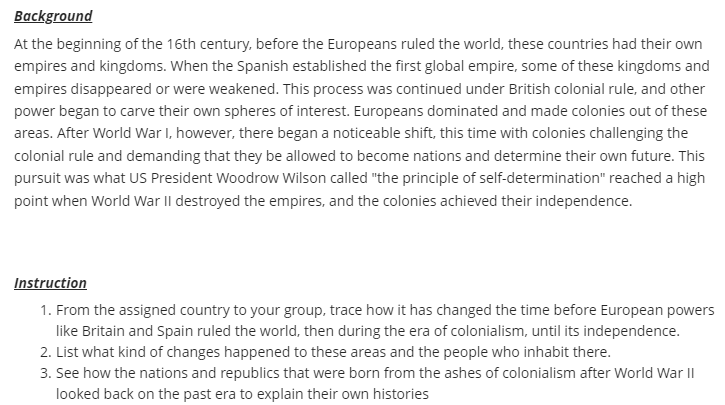Background At the beginning of the 16th century, before the Europeans ruled the world, these countries had their own empires and kingdoms. When the Spanish established the first global empire, some of these kingdoms and empires disappeared or were weakened. This process was continued under British colonial rule, and other power began to carve their own spheres of interest. Europeans dominated and made colonies out of these areas. After World War I, however, there began a noticeable shift, this time with colonies challenging the colonial rule and demanding that they be allowed to become nations and determine their own future. This pursuit was what US President Woodrow Wilson called "the principle of self-determination" reached a high point when World War II destroyed the empires, and the colonies achieved their independence. Instruction 1. From the assigned country to your group, trace how it has changed the time before European powers like Britain and Spain ruled the world, then during the era of colonialism, until its independence. 2. List what kind of changes happened to these areas and the people who inhabit there. 3. See how the nations and republics that were born from the ashes of colonialism after World War II looked back on the past era to explain their own histories
Background At the beginning of the 16th century, before the Europeans ruled the world, these countries had their own empires and kingdoms. When the Spanish established the first global empire, some of these kingdoms and empires disappeared or were weakened. This process was continued under British colonial rule, and other power began to carve their own spheres of interest. Europeans dominated and made colonies out of these areas. After World War I, however, there began a noticeable shift, this time with colonies challenging the colonial rule and demanding that they be allowed to become nations and determine their own future. This pursuit was what US President Woodrow Wilson called "the principle of self-determination" reached a high point when World War II destroyed the empires, and the colonies achieved their independence. Instruction 1. From the assigned country to your group, trace how it has changed the time before European powers like Britain and Spain ruled the world, then during the era of colonialism, until its independence. 2. List what kind of changes happened to these areas and the people who inhabit there. 3. See how the nations and republics that were born from the ashes of colonialism after World War II looked back on the past era to explain their own histories
Related questions
Question

Transcribed Image Text:Background
At the beginning of the 16th century, before the Europeans ruled the world, these countries had their own
empires and kingdoms. When the Spanish established the first global empire, some of these kingdoms and
empires disappeared or were weakened. This process was continued under British colonial rule, and other
power began to carve their own spheres of interest. Europeans dominated and made colonies out of these
areas. After World War I, however, there began a noticeable shift, this time with colonies challenging the
colonial rule and demanding that they be allowed to become nations and determine their own future. This
pursuit was what US President Woodrow Wilson called "the principle of self-determination" reached a high
point when World War II destroyed the empires, and the colonies achieved their independence.
Instruction
1. From the assigned country to your group, trace how it has changed the time before European powers
like Britain and Spain ruled the world, then during the era of colonialism, until its independence.
2. List what kind of changes happened to these areas and the people who inhabit there.
3. See how the nations and republics that were born from the ashes of colonialism after World War II
looked back on the past era to explain their own histories
Expert Solution
This question has been solved!
Explore an expertly crafted, step-by-step solution for a thorough understanding of key concepts.
Step by step
Solved in 2 steps
